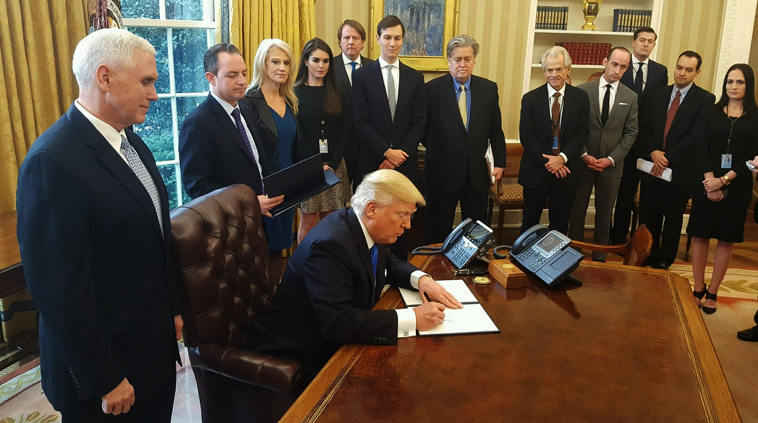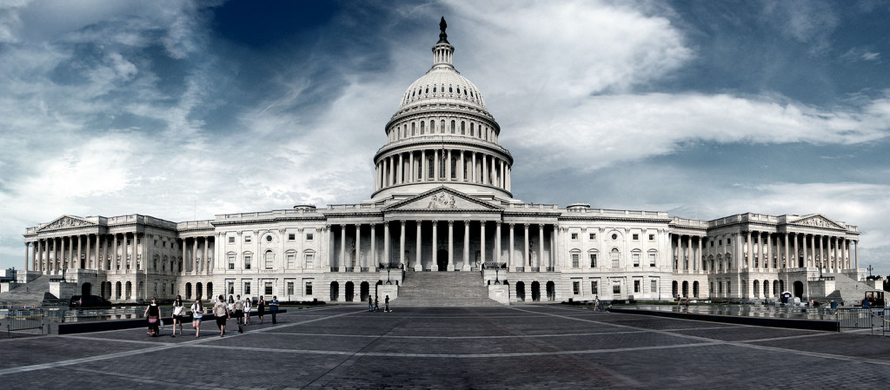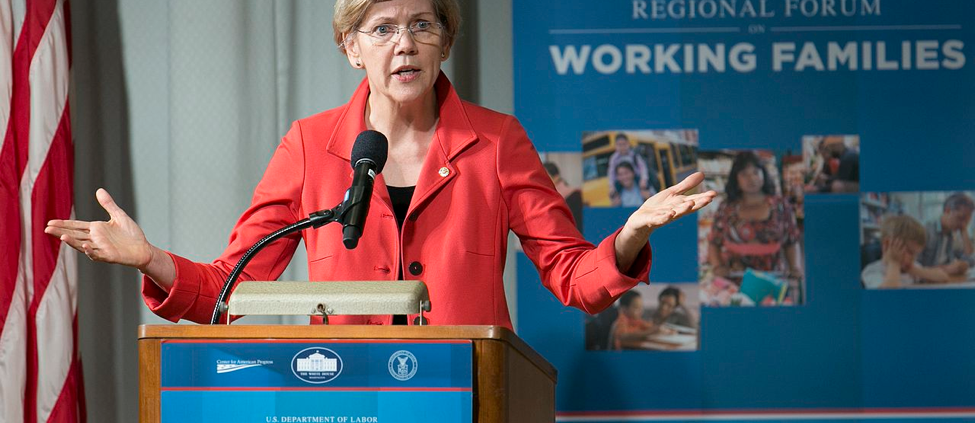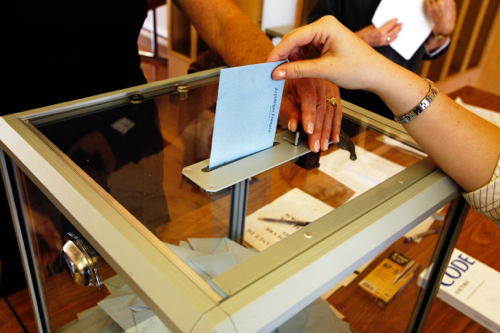Deregulatory Achievements, Big Oil Exodus, and Populist Kids
Here’s What You Need To Know
In the wake of President Trump’s 100th day in office, there was a lot of discussion on the Administration’s lack of legislative accomplishments. But, looking at Trump’s regulatory accomplishments tells a different story. In his first 100 days, Trump’s efforts to undo burdensome government regulation across a variety of policy areas has been a success, whether one agrees or disagrees with the regulatory action.
Trump used the Congressional Review Act (CRA) a total of 13 times to invalidate the Obama Administration’s regulatory measures. Previously, the law had been used only once since its inception in 1996. At the same time, the Administration enacted a 60-day freeze on all last-minute Obama-era regulations that had yet to take effect. The freeze allowed the Administration time to review and then revise or kill many of President Obama’s regulatory initiatives. Some of the measures made more news than others, but here are a few of the rules and regulations the Trump Administration successfully blocked during their first 100 days:
- Stream Protection Rule: A last minute Obama regulation aimed at protecting waterways from mining pollution, the rule offered a vague definition of what is classified as a stream, and Republicans argued it unfairly targeted coal miners while doing little to actually protect waterways.
- Rule on Logging Workplace Injuries: Under President Obama, the Occupational Health and Safety Administration (OSHA) extended the statute of limitations for claims against employers for failing to keep detailed records of workplace injuries. GOP lawmakers declared Trump’s reversal of this extension a win for small businesses who would have suffered high compliance costs under the OSHA regulation that would have been a boon for trial lawyers.
- Elements of the Every Student Succeeds Act: President Trump removed a requirement that state education systems have a federally approved accountability system, as well as the federal government’s authority to evaluate state teacher preparation programs. Trump explained he was “removing an additional layer of bureaucracy to encourage freedom in our schools.”
- BLM Planning 2.0 Rule: This Obama rule expanded the Bureau of Land Management’s authority to administer public lands. Western GOP lawmakers railedagainst the measure for shifting decision making powers about land use from local leaders and to federal bureaucrats.
- Offshore Drilling Restrictions: President Obama closed off 94 percent of the nation’s outer continental shelf to offshore oil and natural gas production before leaving office. Trump has directed Interior Secretary Ryan Zinke to revise and limit these restrictions, which is likely to provide oil and gas producers with greater latitude in expanding their offshore drilling efforts, particularly in the Arctic and Atlantic oceans.
During his tenure, President Obama was criticized for governing through executive action rather than working with Congress to pass legislation to achieve his policy agenda. The problem is, executive action, unlike legislative action, requires the consent of the executive – so without President Obama or another Democrat at the helm to enforce them, every one of the Obama Administration’s executive actions can be revised, rescinded, or even ignored.
President Trump and the Republican Congress’ ability to roll back such a substantial proportion of the Obama agenda represents the greatest pitfall of this executive governing strategy. We will see whether President Trump – who has also been accused by opponents of governing through executive action – learns this lesson over the remainder of his time in office.
News You Can Use
MEASURING BIPARTISANSHIP
The Lugar Center and Georgetown University have released their report on bipartisanship in the 114th Congress (2015-2017), which reviewed how often lawmakers cosponsored legislation with members of the opposing party. The results revealed almost two-thirds of Congressmen and Congresswomen acted more bipartisan when it came to cosponsoring bills during the most recent Congress compared to the 113th Congress (2013-2015).Despite Democratic claims that Republicans are the impediments to bipartisanship in Congress, this study found Democrats are statistically less likely to sign on to legislation with members of the opposing party. With the GOP controlling Congress and The White House, it will be interesting to see whether Democrats can work with Congressional Republicans and the White House or if they only further the partisan entrenchment.
BIG OIL’S CANADIAN EXODUS
Canada possesses the third largest reserve of crude oil in the world, but major international oil companies – including ConocoPhillips, Statoil, Shell, and ExxonMobil – are either pulling out or decreasing their presence in the country. The key rationale for this seemingly counterintuitive move is cost. Thanks to higher levels of carbon intensity in their crude oil and limited pipeline access to markets, Canadian oil operations have some of the highest operating costs in the world.Canadian Prime Minister Justin Trudeau dismissed the oil companies’ moves, arguing the world is ready for a low-carbon economy. Big companies are looking to places where the profit margin is higher, like the Permian Basin in New Mexico and Texas. With the next Canadian federal election scheduled to be held no later than October 2019, this major hit to the country’s energy sector could spell trouble for Prime Minister Trudeau’s reelection chances. At the same time, it could mean even more robust U.S. domestic energy production in coming years, and could shift global energy investments to the U.S. instead of Canada or Saudi Arabia.
THE KIDS ARE ALT-RIGHT (AND LEFT)
The liberal democratic order may have created a generation of voters who have grown up so interconnected with the world that they have taken for granted all the benefits an interconnected society offers. That’s the conclusion pollster (and certified Friend of Delve) Kristen Soltis Anderson came to when she analyzed polling from the first round of the French presidential election last month. Anderson points out that while 30 percent of the youth vote went to the far-left candidate Jean-Luc Melenchon, the second largest contingent of this demographic went to the far-right populist Marine Le Pen.In the U.S., young voters don’t love President Trump, but the one place in his agenda they strongly agree with him is on trade. Polling by Harvard’s Institute of Politics found that young people are decidedly more protectionist than the average voter. On the issue of foreign military engagement, young voters side with the slightly more isolationist view of “America first” touted by President Trump. These opinions place establishment politicians of all stripes around the world in an awkward position since they have spent at least the last 25 years or more preaching globalism. Now the generation they raised appears to be turning on them.
AMERICA’S GAINS COULD MEAN RURAL DECLINE
America’s unemployment rate continues to be low and labor force participation is holding steady after February’s slight increase from record lows. Unfortunately, Conor Sen of Bloomberg posits this is not necessarily good news for rural America. It is true more Americans are holding jobs, but due to a variety of factors, few if any of those jobs are in rural communities.First, high-paying rural jobs – like coal mining and manufacturing – are disappearing, leaving little incentive for in-demand American workers to opt for rural employment. Second, immigration into America is also at historic lows, which Sen suggests will mean that urban firms are more likely than ever to recruit and poach residents from rural America. This phenomenon makes it difficult for businesses to fill their ranks in rural communities and is already hurting areas in northern New England – despite those states all possessing extremely low unemployment rates. So, while positive employment data should be good news for all Americans, Sen suggests it may lead to long-term issues for rural America.
VENEZUELAN CONSTITUTIONAL ADVENTURES
After two months of violent clashes between anti-government protesters and police, Venezuelan President Nicolas Maduro, whose authoritarian dictatorship has ruled the country since the death of Hugo Chavez, has signed a decree to convene a citizens’ assembly to rewrite the country’s constitution. The near-daily protests were sparked by a supreme court decision stripping the opposition-led assembly of its power. The decision was quickly overturned, but proved to be a catalyst for massive public opposition to the Maduro government.At this point, Maduro has not yet released any details on the process, who will be involved in its creation, or what specifically it will aim to change. Opposition leaders have denounced Maduro’s calls for a new constitution, calling it a “giant fraud” since the move would mean forgoing any elections until after the process was completed. The move, therefore, does not appear likely to placate those calling for Maduro’s removal from power. And furthermore, it could represent the final measure either before a coup removing Maduro from power or a sham election that would secure his presidency.
FIRED BECAUSE OF OBAMACARE
Earlier this week, health insurer Molina Healthcare fired their longtime CEO and CFO, Dr. J. Mario Molina and John Molina, respectively, as a result of “disappointing financial performance.” Much of Molina’s poor 2016 performance came thanks to the company’s high-levels of engagement in the individual healthcare exchanges created by Obamacare. Molina’s CEO had been a vocal opponent of Republican plans to repeal Obamacare, and the law’s shaky future combined with Molina’s Obamacare-related financial losses, means Dr. Molina likely owes his firing to the healthcare law he supports. As health insurers try to figure out how to navigate the troubled waters of the Obamacare exchanges, Dr. Molina’s firing may serve as a cautionary tale to those who bet big in favor of Obamacare.









